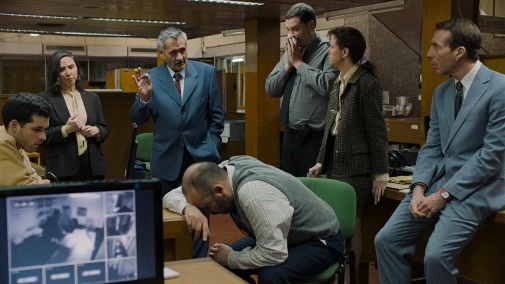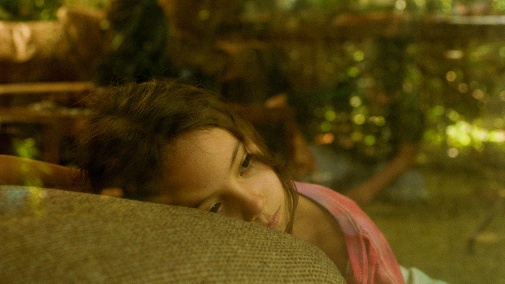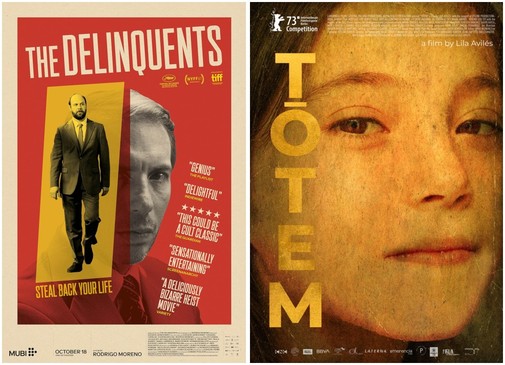Best International Film: Argentina's "The Delinquents" and Mexico's "Tótem"
 Thursday, October 19, 2023 at 10:00AM
Thursday, October 19, 2023 at 10:00AM In its long history, the Academy has awarded the Best International Film Oscar to a Latin-American country four times. The first two were from Argentina, 1985's The Official Story and 2009's The Secret in Their Eyes, followed by Chile with 2017's A Fantastic Woman, and Mexico with 2019's Roma. Looking at those dates, it's fair to say AMPAS has become more open to Latin cinema in the 21st century, even though Europe remains the category's continental champion. Hope remains eternal that voters will broaden their horizons.
I've already reviewed Chile's submission, The Settlers, when at TIFF. So, it's time to consider the films of the other two Latin victors of yesteryear. There's Argentina's newly released The Delinquents, and Mexico's Berlinale prize-winner Tótem…

THE DELINQUENTS, Argentina
What's the purpose of telling a story? Is it to pass information, transmit ideas from one to another in the guise of a narrative? Maybe, it's to perpetuate a moral, a culture, a set of values. Perchance, it's simply to entertain. In its usual forms, cinema, especially the mainstream, tends to correlate with those objectives, elevating the tale rather than the telling to a place of prominence. As ever, there's always the exception that proves the rule. Enter Rodrigo Moreno's The Delinquents, where storytelling is an end unto itself. To elaborate a lark and get lost in wild tangents, to play with form and fable, testing the flexibility of the yarn – that's where the fun is, and, as viewer, you're invited to partake in the folly.
Across 189 minutes, an anecdote's worth of narrative unfurls meandering on screen. In Buenos Aires, there's a bank employee called Morán who, one day, sees an opportunity to steal. Weighting the inevitable prison sentence against the prison of a deadening job, he decides the crime's worth it and that he'll turn himself in to save everyone a lot of trouble. Moreover, the heist isn't very hard. In fact, it's hilariously simple. There's only one wrinkle in the plan, for someone needs to keep the money hidden while he waits through incarceration. So, our robber forces an absent colleague into complicity by stealing enough for two. While Morán is behind bars, Román must keep their fortune hidden.
Just from reading the interchangeable, anagram-like names, you notice Moreno's sense of jest, which extends far beyond these trivial matters. Then again, all of The Delinquents is essentially trivial, unserious, and unashamed of it, basking in the pleasure of imagination unencumbered by the need for some higher meaning. Flashbacks and plotless interludes abound, with everything stopping on its tracks for a protracted picnic, gags repeating senselessly, split screens battling between protagonists to see who'll take over the story. Faced with the film's oddities, some spectators will jump to accusations of pretentiousness, missing the point entirely, as this is as far from pretension as you can get.
The key is to cease chasing notions of decipherment or puzzle-solving, stop worrying and enjoy the ride, slow as it may be. That's not the same as saying The Delinquents is mindless. Themes of pursuing freedom run transversal to its epic duration, echoes getting louder as one closes on the end. Think of the needle-drop soundtrack or the socioeconomic pressures lurking at the margins like ravenous dogs eager to take a bite out of the characters. A heist turns to western, absurdism falls into a Rohmerian joke, a tango gives way to piano concerto, comedy is made deadpan by the camera's patient gaze – The Delinquents shapeshifts from end to end. It's beautifully shot, performed, and cut, so drunk on unexpectedness that you never know what's coming next. It's surprise everlasting, pure cinema through and through.

TÓTEM, Mexico
In reflections of amber gold, mother and daughter share laughter in a public toilet, the camera so close to them, the focus so tight that everything else seems ready to disintegrate into a blur. There's nothing in the world but little Sol and her mother, Lucia, preparing themselves for a night of would-be celebration in lieu of open grief – there will be a surprise party for the girl's sick father, complete with all family and friends. We don't know it yet, but the pair's apparent merriment is a temporary respite from pain, like a band-aid placed over an open wound that will keep oozing despite the plaster. Many of the smiles we see throughout Tótem will reverberate with that same strain that comes when you grasp for something to hold on to as everything falls apart.
It's not just Sol's world that crumbles, though we experience much of this long day's journey into night through her subjectivity. From that anonymous washroom to a house full of life that tries to smother the stench of death, Tótem follows the girl into her family's fold. This gesture invites us to regard the collective clan in the periphery of the child's crisis, one busy domestic universe full of contradictions and complexities beyond the understanding of our little lead. But of course, the camera knows more than she, and through its gaze, the viewer can hold both her truth and the truth of others, negotiating how each family member deals with the unspoken tragedy unfolding within its center.
Moreover, how the adults reckon with the fact they won't be able to spare Sol from what's coming, what it'll do to her, or even what it's already doing, changing her spirit forever with no way back. Yet, as if by miracle, Tótem's bleakness is not monotonal nor one-dimensional. Look through the house, and you'll find ridiculous episodes like a sister's hair-dye anxieties and the other sibling's cake-baking panic. A surly grandfather is all annoyance, dealing, on the one hand, with the little kids' unruly antics and the slightly more grown-up kids' neuroses on the other. If that wasn't enough, there's also a witchy woman spreading incense through the house for some unfathomable reason.
Writer-director Lila Avilés pulls you into her immersive film with a steadily rising sense of intimacy, asking the audience to pay attention to what's left simmering between words and charged silences. She reveals by evading, offering scant contextualization, so that watching her film is to be involved in gradual discovery. It's akin to confronting life's essential chaos and learning to roll with the punches. Going further into Tótem's marvels, each detail feels precious, and it's as if the picture is encouraging you to cherish every one, be it sweet or bitter. The picture thus embodies the urgency of time slipping by. Maybe that's why so much of Tótem feels like watching the present crystalize into memories that will haunt, hurt, but comfort, too. Against the impermanence of life, they're all we have.
As far as Oscar chances go, The Delinquents is probably too weird for AMPAS' taste, while Tótem's emotional wallop feels destined for the shortlist. In any case, they're both among the best films of 2023.




Reader Comments (3)
I'm so excited to hear that NAMIBIA will be enterting the Best International Film list this year with Perivi Katjavivi's UNDER THE HANGING TREE. This is the first film that the Namibia Film Commission has approved that meets the standards required by the Academy Awards. The film, which is in Afrikaans, German, Otjiherero, and English, is a supernatural noir about an impetuous city officer (Girley Jazama) assigned to a case of a murdered German farmer. The film explores the role of the Herero people and their mass genocide in Namibia's colonial history.
Oh, Claudio, you've now got me conflicted. I was hoping you'd say that THE DELINQUENTS was not worthy, as I have a ticket for it on Sunday night at Adelaide Film Festival, but the session will finish late and I have an early work start the next day. I got the ticket because it was an Oscar submission, so there's part of me now saying it's now not a must-see, but you saying it is one of the films of the year compromises that easy solution. Gosh-darn you!
As an aside, I have seen two other movies in the past three days that have joined Iceland's GODLAND on my list of worthy winners of the 2023 International Film Oscar - SHAYDA (Australia) and PERFECT DAYS (Japan). Hopefully they break through (and also break up the all-European lineup in Nathaniel's current prediction list).